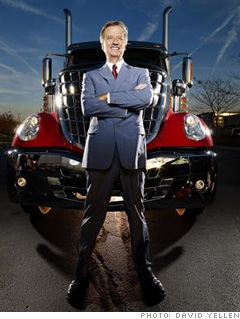
Navistar CEO Dan Ustian, here with a Lonestar truck, manages capital efficiently by buying engines from other companies.
In good times, and especially in a period of low interest rates, it's easy to get lax about capital and to forget the most fundamental rule of business: that you must earn a return on capital that exceeds your capital's cost. That error really hurts now that capital markets have become tight. The unprecedented seize-up of the commercial paper market in September and October forced many companies to rethink all their sources of capital. Dunkin' Brands, which had previously turned to the largest national financial institutions for capital to help franchisees finance new stores, is now finding that healthy regional banks are also a good source.
Companies that are managed explicitly for capital efficiency are stronger now than they would be otherwise. Dan Ustian, CEO of truckmaker Navistar, no longer invests the $350 million to $400 million needed to develop a new engine; instead he buys from others and says he spends $30 million to $40 million optimizing "controls, software, and air-fuel management" to make the engines work best in his trucks. "It's our capital ethos," he says. "We don't need to make another investment." Similarly, knowing that inventory represents warehouses full of capital, Deere avoided the inventory pileups that afflict many manufacturers in a downturn and that have especially hurt the Detroit automakers.
Last updated January 08 2009: 9:17 AM ET
